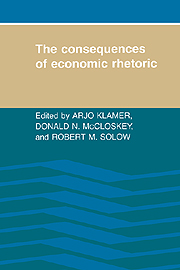Book contents
- Frontmatter
- Contents
- Preface
- The consequences of economic rhetoric
- PART I ECONOMIC RHETORIC: INTRODUCTION AND COMMENTS
- PART II ECONOMIC RHETORIC: FURTHER ARGUMENTS
- PART III ECONOMIC RHETORIC AMONG ECONOMISTS
- PART IV ECONOMIC RHETORIC IN POLITICS AND JOURNALISM
- 13 The heterogeneity of the economists' discourse: Philosopher, priest, and hired gun
- 14 The grammar of political economy
- 15 The rhetoric of economics as viewed by a student of politics
- 16 “Yellow rain” and “supply-side economics”: Some rhetoric that failed
- PART V ECONOMIC RHETORIC: ITS RHETORIC AND ITS CONSEQUENCES
- 1 Appendix: Other contributors and participants
- Index
13 - The heterogeneity of the economists' discourse: Philosopher, priest, and hired gun
Published online by Cambridge University Press: 07 September 2010
- Frontmatter
- Contents
- Preface
- The consequences of economic rhetoric
- PART I ECONOMIC RHETORIC: INTRODUCTION AND COMMENTS
- PART II ECONOMIC RHETORIC: FURTHER ARGUMENTS
- PART III ECONOMIC RHETORIC AMONG ECONOMISTS
- PART IV ECONOMIC RHETORIC IN POLITICS AND JOURNALISM
- 13 The heterogeneity of the economists' discourse: Philosopher, priest, and hired gun
- 14 The grammar of political economy
- 15 The rhetoric of economics as viewed by a student of politics
- 16 “Yellow rain” and “supply-side economics”: Some rhetoric that failed
- PART V ECONOMIC RHETORIC: ITS RHETORIC AND ITS CONSEQUENCES
- 1 Appendix: Other contributors and participants
- Index
Summary
Causes of variety
To the layperson it seems that an economist is an economist is an economist. When the economists emerge from their lairs they all sound the same and use the same arguments and analytical tools. Superficially, at least, their statements are predictable, with frequent reference to expensive lunches and trade-offs, enlivened only occasionally by obscure internal squabbles and controversies over fine points of theory. To one who is familiar with the confusing history of the discipline, the situation appears infinitely more complex. Not only is the “profession” of “economist” ill defined and riven by methodological and ideological differences, but most members converse professionally with many kinds of partners on a wide range of subjects. Few fields of science reveal such diversity of conversation. Several features of economics are at least unusual, if not unique.
First, paradigmatic cleavages persist for extended periods, reflecting both methodological and ideological differences of a fundamental character, not only between Marxians and neoclassical economists, but among Keynesians, post-Keynesians, neo-Institutionalists, monetarists, and a host of other smaller sects. Second, and probably of greater significance, the community of economists has never fully come to grips with the difference between a scientific “discipline” pursuing truth and a “profession” selling services at market prices. To complicate the situation, the profession's rhetorical products are in demand both in the public sector, where, in principle, the “public good” is the norm, and also in the private sector, where private gain is the objective.
- Type
- Chapter
- Information
- The Consequences of Economic Rhetoric , pp. 207 - 220Publisher: Cambridge University PressPrint publication year: 1989
- 7
- Cited by

